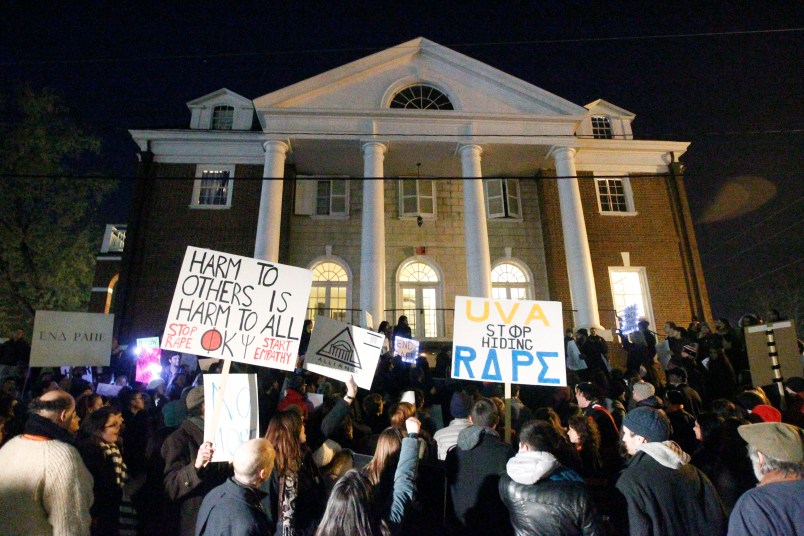Journalists have raised concerns about the depth of reporting in the November Rolling Stone article that described a gang rape at fraternity at the University of Virginia.
Media critics have questioned why reporter Sabrina Rubin Erdely’s did not do more to contact the men accused of raping a student and whether Rolling Stone did enough to fact check the victim’s account of the assault.
Erdely reported on University of Virginia freshman Jackie’s account of a gang rape in September 2012 at the Phi Kappa Psi and the university’s slow response to her case.
Few have questioned Erdely’s account of the frat culture, University of Virginia’s response, and school policies on investigating sexual assaults. And the piece both spurred the university to suspend fraternities until January and led to a local police investigation of the 2012 rape.
Few have taken their criticism of Erdley as far as libertarian magazine Reason, which wondered if Jackie’s story was a “gigantic hoax.”
But after a Slate interview with Erdley late last month, multiple journalists have questioned her reporting on the rape itself.
Slate’s Allison Benedikt and Hanna Rosin pointed out that “the piece is missing is one small thing: that single, standard sentence explaining that the alleged perpetrators of the crime deny it, or don’t deny it, or even that they could not be reached for comment.”
They found Erdley’s response during an interview on a Slate podcast as to how she tried to contact the accused unsatisfactory. Erdley explained that she tried contacting the fraternity:
I reached out to them in multiple ways. They were kind of hard to get in touch with because [the fraternity’s] contact page was pretty outdated. But I wound up speaking … I wound up getting in touch with their local president, who sent me an email, and then I talked with their sort of, their national guy, who’s kind of their national crisis manager. They were both helpful in their own way, I guess.
Washington Post media critic Erik Wemple laid out his skepticism about Erdley’s reporting on Tuesday.
He criticized Erdley for not reaching out to the alleged rapists and failing to name the witnesses. He also criticized her for simply stating that she believed Jackie.
“I will just say that I found her story — I found her to be very credible,” Erdley told Slate.
Wemple also said that Erdley has started “hedging” by emphasizing that the story of the gang rape was told from Jackie’s perspective.
“The degree of her trauma — there’s no doubt in my mind that something happened to her that night. What exactly happened, you know, I wasn’t in that room. I don’t know and I do tell it from her point of view,” Erdley told Slate.
In a statement to the Washington Post, Rolling Stone insisted that the story was fact-checked.
“Through our extensive reporting and fact–checking, we found Jackie to be entirely credible and courageous and we are proud to have given her disturbing story the attention it deserves,” the statement reads.
Erdley herself also defended her article and reporting.
“I am convinced that it could not have been done any other way, or any better, she told the New York Times on Tuesday. “I am also not interested in diverting the conversation away from the point of the piece itself.”
And a couple journalism professors told the New York Times that they saw nothing wrong with Erdley’s piece.
“If a reporter were doing a story about a university accused of failing to address the mugging or robbery of a student, that reporter would not be expected to interview the alleged mugger or robber,” Columbia University journalism professor Helen Benedict said. “The piece might have been stronger with more than one source, but exposés of wrongdoing often start with one whistle-blower.”







Were police ever brought into this?
If so, did they ever speak with the press?
If they were not notified, does anybody know why?
The story was about how the school handled the case. Why do the cynics at Reason care so much about the alleged rapists? Guilty conscience? Fundamental moral defect?
“Few have questioned Erdely’s account of the frat culture”
Uh, part of the account of “the frat culture” is that a gang rape occured amongst several students and that a woman bleeding from broken glass wounds was able to leave shortly afterwards without so much as anyone raising an eyebrow. And more or less the entirety of the accuracy of this account has been brought into question. Here’s a better rundown: http://www.mindingthecampus.com/2014/12/more-questions-about-rolling-stone-and-uva/
So, wrong on that.
While not defending rape or any of the perpetrators, there is always reason to exercise skepticism about sensational stories or reporting. Or have we all forgotten Stephen Glass?
Somehow didn’t think TPM would be in the “questions have been raised” zone of reporting. Are you taking a position or not?